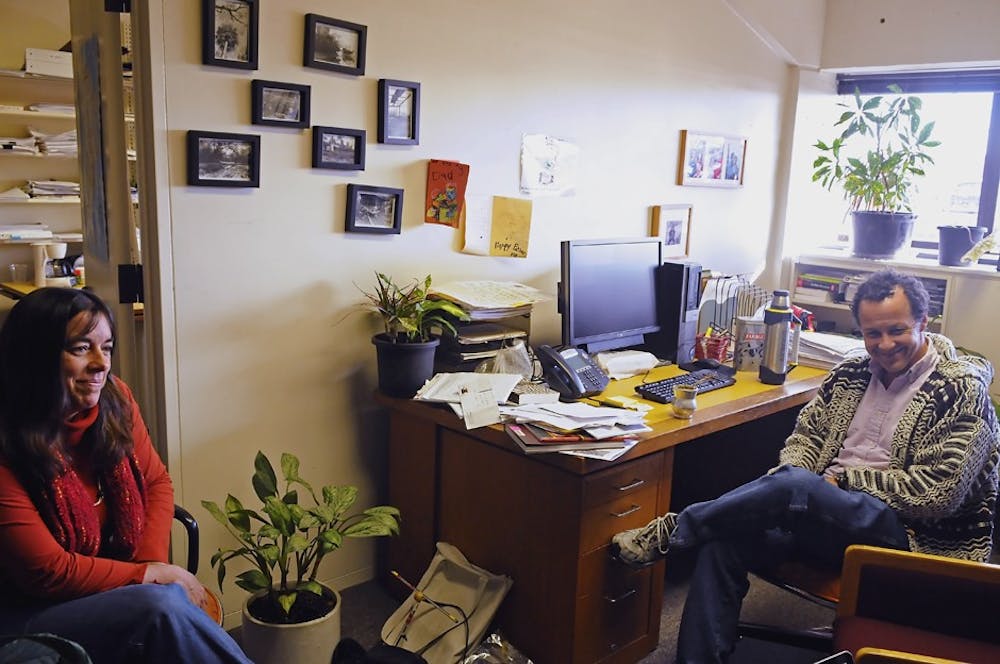For some Penn professors, the separation between work and home life is barely more than a wall.
Both assistant professors of anthropology, Claudia Valeggia and Eduardo Fernandez-Duque were married for 18 years before joining Penn’s faculty in 2005. They are one of a number of married couples that work at the University, often in the same department. In addition to teaching a class together, they share office space separated by a single wall.
Whether next-door neighbors at work or not, spouses have been increasingly hired together by universities for the past 30 years, a trend examined in a 2006 survey conducted by Stanford University professor Londa Shiebinger.
Coined “the two-body problem” in academic circles, the practice is sometimes viewed as a way to attract valuable faculty by taking their family lives into account.
When professor of mechanical engineering Katherine Kuchenbecker first interviewed at Penn, the idea of hiring both her and her husband came from other engineering faculty. “The chair of my department was really excited when he found out that my future husband was also a doctoral student in mechanical engineering at Stanford,” Kuchenbecker said.
Kuchenbecker and her husband, MEAM lecturer and laboratory program director Jonathan Fiene, also work in close quarters, with offices a few doors away from each other in the Towne Building. As Kuchenbecker explained, this simply adds to her long history of professional collaboration with Fiene, whom she met while they were both earning doctoral degrees at Stanford.
Now, Kuchenbecker said, they are working toward somewhat different professional goals, as she conducts research for a laboratory at Penn and Fiene is primarily focused on teaching.
For cinema studies professors Emory and Kathleen Van Cleve, working for the same university means navigating different roles in overlapping departments. Emory teaches filmmaking classes cross listed with Fine Arts, while Kathleen — who graduated with a dual degree from Wharton and the College in 1988 — teaches screenwriting courses cross-listed in the English department.
Even with their different focuses, both see certain advantages to working in the same field as their spouse. “There’s a much quicker shorthand about what went on at work every day,” Emory said. Next semester, their shared vocabulary is only going to increase, as they will be collaborating as professors for the first time to teach a Cinema Studies and Management class called The Art and Business of Film.
The course co-taught by Valeggia and Fernandez-Duque more directly highlights their relationship to students — an anthropology class entitled Sex and Human Nature.
Fernandez-Duque said the decision to co-teach seemed natural, given their different areas of expertise within the topic. “We realized we would not be offering students the best class we [could] if we taught it separately,” he said, explaining that he specializes in the evolutionary explanation of sex and Valeggia in proximate causes like genetics and physiology.
Professional collaboration has always played a role the couple’s relationship, following them from their studies as undergraduates at the University of Buenos Aires to programs at the University of California, Harvard University and Argentina’s National Council of Scientific and Technological Research before they eventually settled at Penn.
One important aspect of their relationship has been common principles, Valeggia said. “No matter what minor disagreements — or sometimes they feel like major disagreements — we have, deep down we feel like we share the same values,” she said. “And that has sustained us as a couple as well as a professional team.”
Kuchenbecker described a similar bond between she and Fiene that helps to explain how they found each other in the same field. “Our marriage is built on shared values that attracted us to one other, so it’s not surprising that we would both be interested in working at the same institution or department,” she said.
Still, Valeggia and Fernandez-Duque stressed that while the path of collaboration and commitment has worked for them since they were in college, not everyone has to follow this route.
“It’s worked for us,” Fernandez-Duque said. “For someone else, it [can] work to go through several relationships, if that’s how they find their happiness.”



